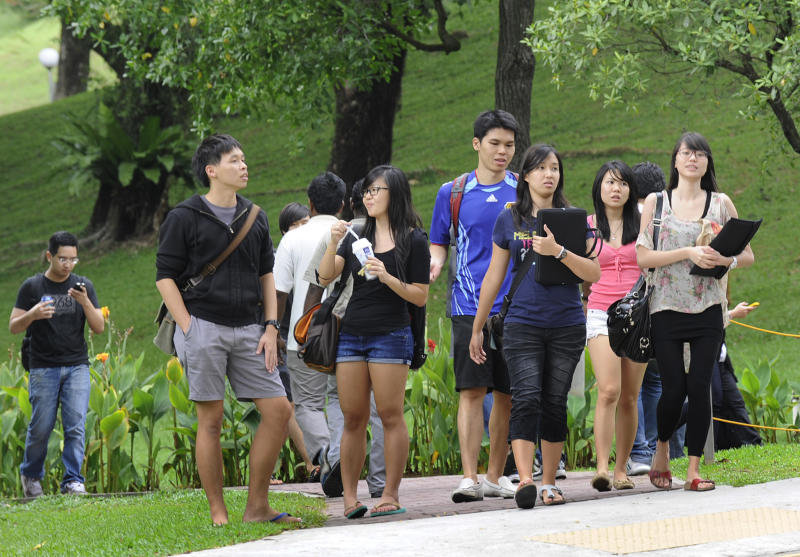Slippers too sloppy? Having a dress code is too strict? Tertiary students' casual dressing ignites debate
Sign up now: Get ST's newsletters delivered to your inbox

A forum letter published in The Straits Times criticised university students for wearing slippers, shorts and T-shirts to attend lectures and tutorials.
PHOTO: ST FILE
SINGAPORE - Mr Francis Sim, 24, wears a T-shirt and bermudas to his classes at Nanyang Technological University (NTU) regularly.
The final-year student at NTU School of Computer Science and Engineering, said he dresses down because he lives in a residential hall on campus and his classes are held close by.
"Hall becomes home, and school becomes the nearby coffee shop or neighbourhood mall. When you are at home, you don't have to dress up to go to the coffeeshop in your neighbourhood."
While Mr Sim is not too fussed with what he wears to lectures and tutorials, casual attitudes towards dressing like his among tertiary students has recently ignited debate over whether these students are sloppy in what they wear when attending classes.
A forum letter published in The Straits Times on Thursday (Dec 28), criticised university students for attending lectures and tutorials in "slippers, shorts and T-shirts" instead of shoes, trousers and shirts with sleeves.
"This does not seem like an appropriate way to dress," wrote forum writer Pavithran Vidyadharan. While not calling for tertiary students to wear uniforms, the writer suggested implementing a dress code to demonstrate "to the world that we are a disciplined society".
Forum writer Lionel Loi Zhi Rui responded in a letter published on Saturday (Dec 30), that a dress code does not correlate with being better thinkers or more creative individuals.
"Not dictating the types of clothes to be worn keeps the focus on students sharing or gaining knowledge," he wrote.
While some universities here do have dress codes, they are guidelines instead of regulations and are not strictly enforced.
A National University of Singapore (NUS) spokesman told The Straits Times that the school has guidelines encouraging students to dress appropriately on campus.
"These guidelines are part of the University's Code of Student Conduct, and serve as a reminder to students that by dressing well, they will be able to make a positive impression on others."
The code deems attire such as revealing clothes or those with offensive designs, inappropriate. Singlets and slippers may also present the school in poor light.
Nanyang Technological University has the same guidelines.
However, appropriate attire and footwear are strictly enforced for lessons in laboratories and workshops. For example, students must wear lab coats and covered shoes for lab lessons.
The Singapore Management University (SMU) said it does not enforce a dress code at all.
In treating students as "responsible adults", it expects them to "take pride" in their appearance, a spokesman told The Straits Times.
Some students here, like Mr Sim, have pointed out issues with wearing formal clothes, noting that factors such as Singapore's weather play a part in their more casual choice of dressing.
Mr Isaac Neo, 23, a third-year student at the Faculty of Arts and Social Science in NUS, said that Singapore's environment drives students to dress down.
"Our climate is very hot, and sometimes classrooms can be very far apart, so students dress in more comfortable attire such as shorts and slippers. They may also have only one class for the day hence they do not feel the need to dress up."
He added, however, that students should still dress better for activities which require a certain degree of decorum, such as during class presentations.
Third year SMU accountancy student Alysson See, 21, said that she understands why some of her peers choose to dress down, due to convenience and comfort.
But with her school located between Dhoby Ghaut and City Hall, she feels that there is "a pressure to look good in town", so as not to be judged by others including her schoolmates.
Dr Liew Kai Khiun, 44, who has been teaching communication and media studies at a local institution for almost a decade, said he it does not matter to him what his students wear, as long as they turn up, are attentive and not disruptive in class.
"In a big class, there can be 200 over people. I'm not concerned about how each individual dresses," he said.
"Students already go through at least 10 years in uniforms. And for guys, another two years (doing national service). Then, when they go out to work, they also have a dress code. This is really the only time they can dress freely."
Still, he stressed that his sentiments might not be shared by all of his colleagues.
Mr Seah Kian Peng, Marine Parade GRC MP who sits on the Government Parliamentary Committee (GPC) for Education, said that there is no need to be too prescriptive in policing the dressing of university students.
However, he added that students should remember there is still a certain degree of decorum expected in an educational institution.
"Most of the students are at least 18, so they are actually young adults. They should have a sense of decency and appropriateness."
Fellow Education GPC member Mr Ang Wei Neng, MP for Jurong GRC, agreed that while dress codes need not be too stringent, they also have to be respectful.
"They have to give due respect to their lecturers and professors teaching them. They don't have to wear gowns and suits and ties, but don't wear bedroom slippers or pyjamas to a lesson either, which I'm sure some students do."


